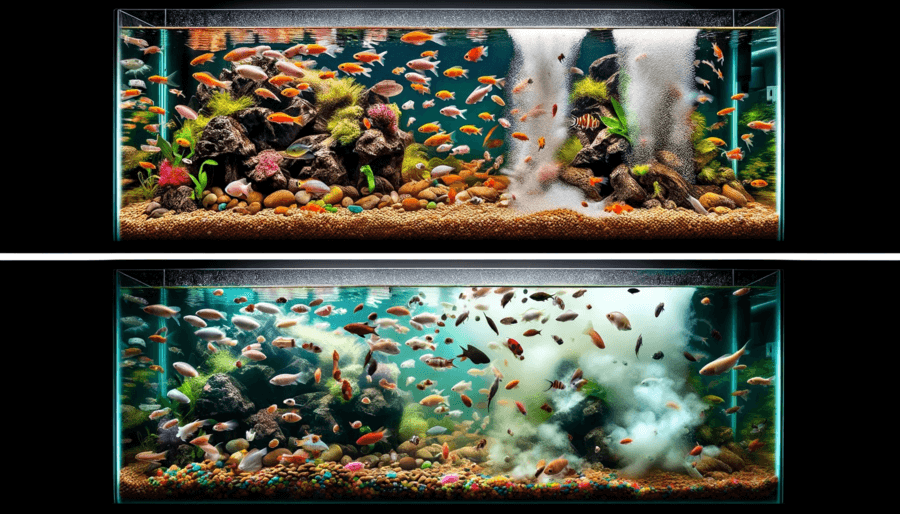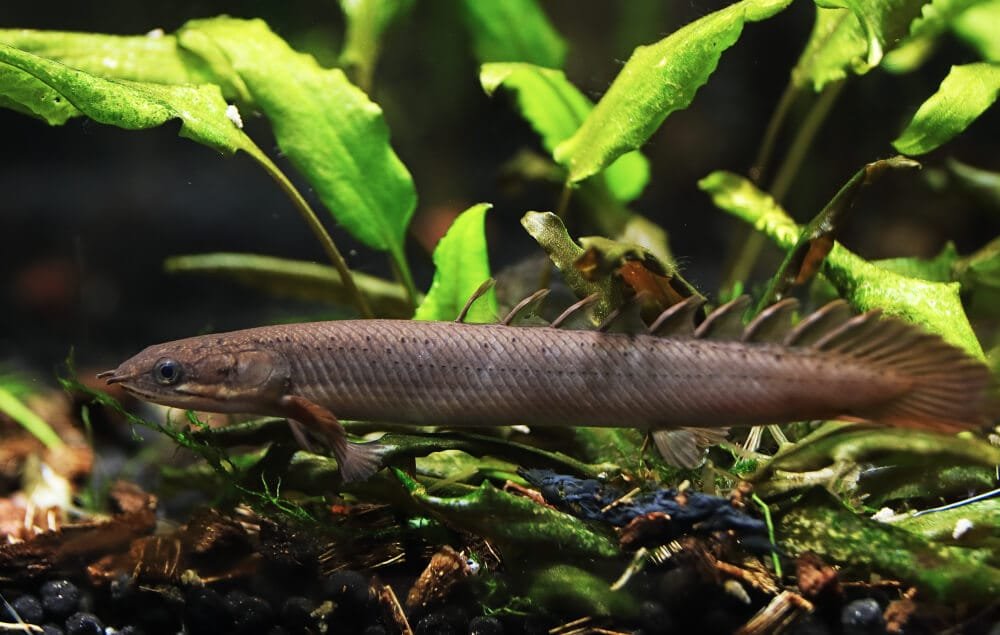Are you a fish enthusiast who loves keeping aquariums filled with colorful and vibrant fish? If so, you may have encountered a common challenge: overfeeding. It’s easy to want to spoil your aquatic friends with extra food, but overfeeding can lead to a plethora of health problems for your fish. In this article, we will explore some simple yet effective tips on how to prevent overfeeding in your aquarium fish, ensuring their well-being and longevity. With these tips in mind, you can maintain a healthy and balanced feeding routine for your underwater companions.
Understanding the Importance of Preventing Overfeeding
Overfeeding is a common issue that many aquarium owners face, and it can have detrimental effects on the health and well-being of your fish. Understanding the importance of preventing overfeeding is crucial in maintaining a healthy and thriving aquarium ecosystem.
Effects of Overfeeding on Aquarium Fish
Overfeeding can lead to a multitude of problems for your aquarium fish. One of the most immediate and noticeable effects is a decline in water quality. Excess food that is left uneaten will break down and release harmful toxins into the water, such as ammonia and nitrites. This can lead to poor water conditions, stress, and even death of your fish.
Furthermore, overfeeding can result in obesity and associated health issues. Just like with humans, fish can become overweight if they consume more food than their bodies require. This excess weight can put strain on their organs, leading to various illnesses and a shortened lifespan.
The Role of Proper Nutrition in Fish Health
Proper nutrition plays a significant role in the overall health and wellbeing of your aquarium fish. Providing a balanced diet that meets their species-specific dietary needs is essential for their growth, immune system function, and reproductive health.
Fish require a variety of nutrients to thrive, including proteins, carbohydrates, fats, vitamins, and minerals. These nutrients can be obtained from various food sources, such as flakes, pellets, live foods, and even vegetables.
Determining the Correct Feeding Amount
Feeding your fish the correct amount of food is crucial in preventing overfeeding. It is important to consider the species-specific dietary needs, feeding frequency, and guidelines for common aquarium fish.
Species-Specific Dietary Needs
Different fish species have varying dietary requirements. Some fish are herbivores and require a diet rich in algae and plant matter, while others are carnivorous and need a diet high in protein. Researching the specific dietary needs of your fish species is essential in providing them with the nutrition they require.
Feeding Frequency
Feeding frequency depends on the eating habits of your fish species. Some species thrive on multiple small meals throughout the day, while others do well with two to three feedings. It is important to observe your fish and adjust their feeding frequency accordingly.
Feeding Guidelines for Common Aquarium Fish
Common aquarium fish, such as goldfish and bettas, often have specific feeding guidelines. It is recommended to feed goldfish small amounts 2-3 times a day, while bettas thrive on one or two small feedings per day. Following these guidelines can help prevent overfeeding and ensure the health of your fish.
Observing Fish Behavior and Body Condition
Observing your fish’s behavior and body condition is essential in determining if they are being overfed. Knowing the signs of overfeeding and monitoring their growth and overall health can help you adjust their feeding routine accordingly.
Signs of Overfeeding
There are several signs that indicate your fish may be overfed. These include fish constantly begging for food, a noticeably bloated or distended stomach, sluggishness, and even aggression towards tankmates. If you notice these signs, it is important to reduce their food intake and evaluate their diet.
Monitoring Fish Growth and Health
Regularly monitoring your fish’s growth and overall health is crucial in preventing overfeeding. If you notice rapid weight gain or abnormal growth patterns, it may be an indication that your fish is being overfed. Consult with a veterinarian or aquarium professional to ensure you are providing the correct diet and feeding routine for your fish.
Establishing a Feeding Routine
Establishing a consistent feeding routine is key in preventing overfeeding and maintaining a healthy aquarium environment. Consistency in feeding schedule and avoiding uneaten food accumulation are important aspects to consider.
Consistency in Feeding Schedule
Fish thrive on routine, so establishing a consistent feeding schedule is essential. Determine the appropriate number of feedings per day for your fish species and stick to that schedule. This will ensure that your fish are receiving the correct amount of food and prevent overfeeding.
Avoiding Uneaten Food Accumulation
Uneaten food left in the tank can quickly contribute to poor water quality and overfeeding. To avoid this, only feed your fish what they can consume within a few minutes and remove any uneaten food promptly. This will help maintain a clean and healthy environment for your fish.
Choosing Appropriate Fish Food
Choosing the right fish food is crucial in providing your fish with optimal nutrition and preventing overfeeding. Understanding the different types of fish food, optimal nutritional content, and avoiding low-quality food with fillers is important.
Understanding Different Types of Fish Food
There are various types of fish food available, such as flakes, pellets, freeze-dried, live, and frozen foods. Each type has its advantages and disadvantages, and it is important to consider the dietary needs and preferences of your fish species when choosing the appropriate food.
Optimal Nutritional Content
Different fish species have varying nutritional requirements. It is important to select fish food that provides a balanced diet, including the essential nutrients your fish need to thrive. Look for food that is specifically formulated for your fish species and contains a good balance of proteins, carbohydrates, fats, vitamins, and minerals.
Avoiding Low-Quality Food with Fillers
Low-quality fish food often contains fillers, such as corn or wheat, that offer little nutritional value to your fish. These fillers can contribute to overfeeding and poor water quality. It is recommended to choose high-quality fish food that is specifically formulated for your fish species and does not contain unnecessary fillers.
Utilizing a Variety of Food Sources
Offering a variety of food sources to your fish has several benefits, including reducing the risk of overfeeding. Incorporating live and frozen foods, as well as supplementing with vegetables and algae, can provide a balanced and interesting diet for your fish.
Benefits of Offering Varied Food
Feeding your fish a varied diet offers several benefits. Firstly, it helps ensure that they receive a wide range of nutrients to support their overall health and immune system function. Secondly, it mimics their natural diet in the wild and provides mental stimulation. Lastly, it reduces the risk of overfeeding by introducing different food sources and preventing boredom.
Incorporating Live and Frozen Foods
Live and frozen foods, such as brine shrimp, bloodworms, and daphnia, are excellent sources of nutrition for your fish. These foods can be purchased or even cultured at home. Introducing live and frozen foods into your fish’s diet provides a high-quality protein source and adds diversity to their menu.
Supplementing with Vegetables and Algae
Vegetables and algae are important components of the diet for herbivorous fish species. Incorporating blanched vegetables, such as spinach or zucchini, and algae wafers or sheets can provide essential nutrients and promote natural foraging behavior. These supplements can also help prevent overfeeding by reducing the reliance on protein-rich foods.
Feeding Techniques to Minimize Overfeeding
Using proper feeding techniques can significantly minimize the risk of overfeeding in your aquarium. Employing small portions at a time, feeding only what fish can consume in a few minutes, and avoiding excessive treats are vital practices to prevent overfeeding.
Small Portions at a Time
Rather than dumping a large amount of food into the tank, it is recommended to feed your fish small portions at a time. This allows you to observe their feeding behavior and ensure they are consuming all the food provided.
Feed Only What Fish Can Consume in a Few Minutes
To prevent overfeeding, only provide your fish with what they can consume within a few minutes. This ensures that they are receiving the appropriate amount of food and that excess food is not left to decompose and negatively impact water quality.
Avoiding Excessive Treats
While treats can be a fun addition to your fish’s diet, it is important to avoid excessive indulgence. Overfeeding treats can easily lead to an unhealthy diet and contribute to weight gain. Treats should be offered sparingly and should not replace their regular balanced diet.
Avoiding External Overfeeding Factors
In addition to monitoring your own feeding practices, it is important to be aware of external factors that can contribute to overfeeding. Minimizing accidental overfeeding by other tank inhabitants, removing uneaten food promptly, and ensuring proper water quality are essential considerations.
Minimizing Accidental Overfeeding by Other Tank Inhabitants
If you have a community tank with different species of fish, it is crucial to ensure that all the inhabitants are receiving the appropriate amount of food. Some fish species are more aggressive and dominant at feeding time, which can result in others being deprived or overfed. It is important to monitor their behavior and intervene if necessary to prevent overfeeding.
Removing Uneaten Food
If any food remains uneaten after a few minutes, it should be promptly removed from the tank. Uneaten food can quickly contribute to poor water quality and overfeeding. Using a net or siphon can help remove any excess food efficiently.
Ensuring Proper Water Quality
Maintaining proper water quality is essential in preventing overfeeding-related issues. Regular water testing and proper filtration are necessary to remove excess nutrients and maintain a healthy environment for your fish. By ensuring good water quality, you can minimize the risk of overfeeding-related complications and promote the overall health of your aquarium ecosystem.
Educate and Train Aquarium Fish
Educating and training your aquarium fish can contribute to preventing overfeeding. By training them to recognize cues for feeding and promoting natural foraging behavior, you can establish a healthier feeding routine.
Training Fish to Recognize Cue for Feeding
Fish are capable of learning to recognize cues for feeding, such as a specific hand gesture or a tapping sound on the tank. By consistently associating the cue with feeding, you can prevent unnecessary feeding and overfeeding episodes.
Promoting Natural Foraging Behavior
Encouraging natural foraging behavior in your fish can provide mental stimulation and reduce the risk of overfeeding. This can be achieved by incorporating feeding enrichment devices, such as food puzzles or floating plants, that require your fish to search for their food. By simulating their natural environment and feeding behavior, you can promote a healthier and more balanced feeding routine.
Seeking Expert Advice and Monitoring
While following these guidelines can greatly reduce the risk of overfeeding, it is important to seek expert advice and regularly monitor your fish’s health and overall well-being.
Consulting with Aquarium Professionals
If you have any concerns or questions about feeding practices or fish health, it is always a good idea to consult with aquarium professionals. They can provide specific advice based on your aquarium setup and fish species, ensuring that you are providing the best care for your fish.
Regular Monitoring of Fish Health
Regularly monitoring your fish’s health is crucial in catching any potential issues early on. Keep an eye on their behavior, body condition, and growth patterns. If you notice any abnormalities or signs of poor health, consult with an expert to address the issue promptly.
In conclusion, preventing overfeeding is essential in maintaining a healthy aquarium ecosystem. By understanding the effects of overfeeding, determining the correct feeding amount, observing fish behavior and body condition, establishing a feeding routine, choosing appropriate fish food, utilizing a variety of food sources, employing feeding techniques to minimize overfeeding, avoiding external overfeeding factors, educating and training aquarium fish, and seeking expert advice and monitoring, you can provide your fish with the optimal nutrition and prevent the risks associated with overfeeding. Remember, a well-fed and healthy fish is a happy fish!




